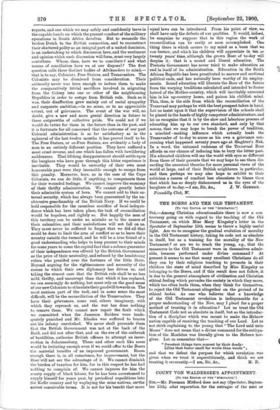THE BOERS AND THE OLD TESTAMENT.
[To THE EDITOR Or THE "SPECTATOR."] Sra,—Among Christian educationalists there is now a con- troversy going on with regard to the teaching of the Old Testament, on which Miss Mary Kingsley'a letter in the Spectator of September 15th seems to throw a highly useful light. Are we to recognise the gradual evolution of morality in the Old Testament history, taking its code not as absolute in itself, but as a training for the morality of the New Testament ? or are we to teach the young, e.g., that the massacres in the Old Testament were in themselves admir- able, because performed under divine command ? At present it seems to me that many excellent Christians do all they can by their religious teaching to promote in their children the state of mind described by Miss Kingsley as belonging to the Boers, and if this result does not follow, it is due to the general atmosphere of civilisation and Christian ethical feeling which pervades the society in which they move, which too often leads them, when they think for themselves, to reject the Old Testament altogether on the groimd of its ethical laches. As one who believes that a knowledge of the Old Testament revelation is indispensable for a proper understanding of the New, may I plead for a proper method of treating it in education? Let us treat the Old Testament Code not as absolute hi itself, but as the introduc- tion of a discipline which was meant to make the Hebrew nation capable of receiving the teaching of our Lord. Let us not shirk explaining to the young that "The Lord said unto Moses" does not mean that a divine command for the extirpa- tion of the Moabites was literally given to the Hebrew law- giver. Let us remember that- " Sweetest things turn sourest by their deeds : Lilies that fester smell far worse than weeds ";
and that we defeat the purpose for which revelation was given when we treat it superstitiously, and think we are
treating it reverently.—I am, Sir, &c., M. B.






































 Previous page
Previous page